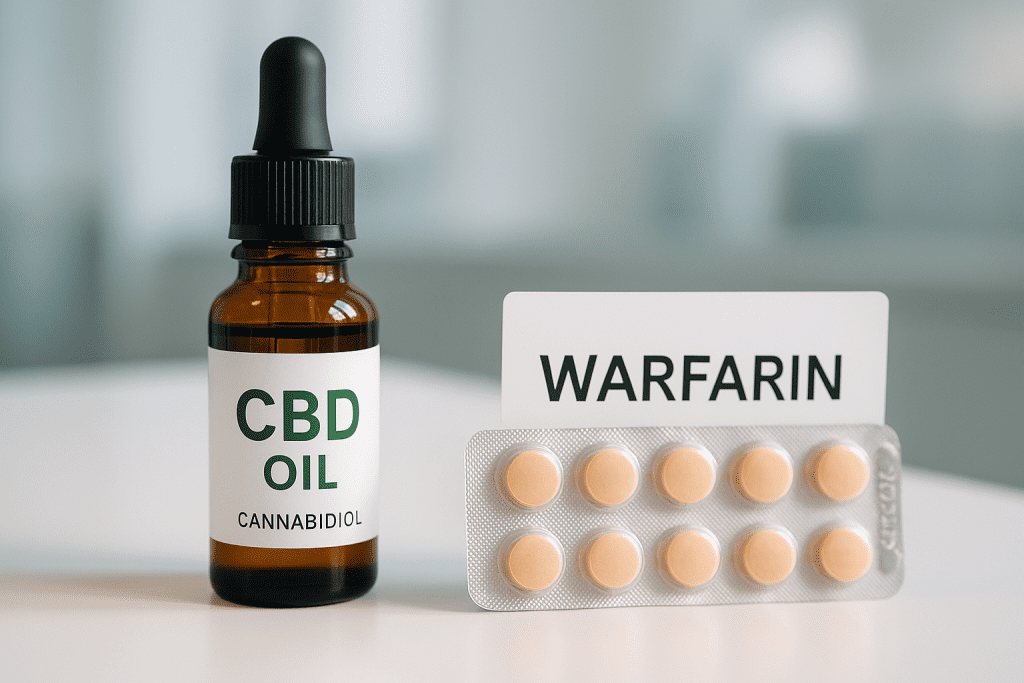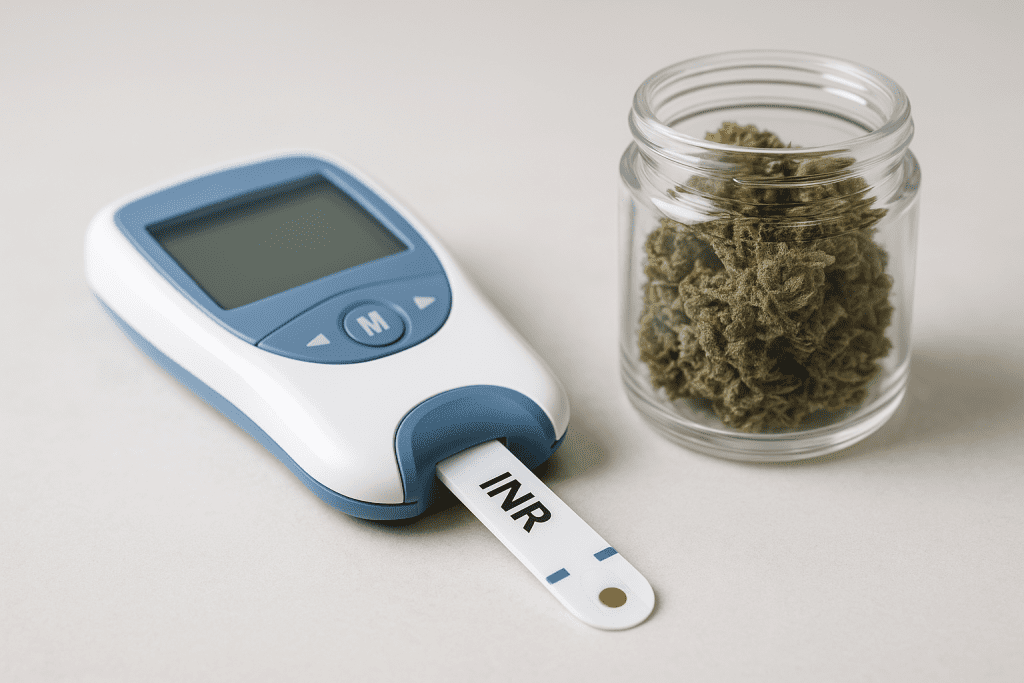
Understanding the Risks of CBD and Warfarin Combined
As cannabidiol (CBD) use grows in popularity, patients on anticoagulant therapy—particularly warfarin—face important safety considerations. The potential for a serious CBD warfarin interaction stems from how CBD affects liver enzymes critical for drug metabolism. Specifically, CBD can inhibit CYP450 enzymes such as CYP2C9, which metabolizes warfarin’s most active form.
This guide will explore the science behind how CBD raises INR levels, review compelling case reports, and offer evidence-based monitoring strategies for anyone using CBD alongside warfarin or similar blood thinner medications.
Quick Summary: CBD and Warfarin Interaction
| Key Issue | Details |
|---|---|
| Main Concern | CBD inhibits CYP2C9, slowing warfarin metabolism |
| Resulting Effect | INR elevation and increased bleeding risk |
| Clinical Evidence | Multiple case studies confirm elevated INR with CBD/cannabis use |
| Recommended Action | Monitor INR within 1–2 weeks of CBD initiation or dose change |
| Potential Warfarin Adjustment | Dosage reductions of ~30% often needed |
How CBD Alters Warfarin Metabolism
CYP450 Enzyme Inhibition
CBD significantly impacts how the body processes medications by inhibiting the cytochrome P450 (CYP450) enzyme system—especially CYP2C9, which metabolizes the S-isomer of warfarin, its more potent anticoagulant form.
This enzyme inhibition leads to slower warfarin clearance, allowing more of the drug to circulate in the bloodstream. As a result, INR (International Normalized Ratio) values rise, increasing the risk of excessive bleeding.
Even FDA-approved cannabidiol medications like Epidiolex note this risk, stating that CBD is predicted to cause “clinically significant interactions with CYP2C9 substrates” such as warfarin.
The Role of THC
Tetrahydrocannabinol (THC), often present in full-spectrum cannabis products, also inhibits CYP2C9. This dual cannabinoid effect may explain the cannabis blood thinner interaction observed in users of both CBD oil and recreational cannabis.
Clinical Cases: CBD Raises INR Levels
Case Report Highlights
- A man with Marfan syndrome on stable warfarin therapy (INR 2.0–2.6) joined a clinical trial for Epidiolex. With each dose increase, his INR rose disproportionately—peaking at 6.86. Warfarin had to be reduced by 30% to stabilize levels (PMC).
- Another case from Today’s Geriatric Medicine involved a patient whose INR rose to 7.2 after starting cannabis edibles and smoking. Discontinuation of cannabis brought INR back to baseline (source).
- An elderly woman taking medical cannabis with both THC and CBD showed no significant INR changes, demonstrating that individual factors and product formulations matter (PubMed).
These examples emphasize the need for individualized monitoring, especially during dosage changes or product switches.
Monitoring INR: When and How Often?

Recommended INR Testing Schedule
Patients taking warfarin who begin CBD oil or cannabis should:
- Test INR within 1–2 weeks of starting CBD or any herbal product (Redalyc Review)
- Monitor weekly to biweekly during dosage changes
- Resume frequent monitoring if CBD is discontinued
Some expert guidelines suggest INR checks after every 5 mg/kg/day increase in CBD during titration, especially with prescription cannabidiol like Epidiolex.
How Much Warfarin Reduction Might Be Needed?
In documented cases, warfarin doses were reduced by approximately 30% to re-establish target INR levels.
This highlights the importance of collaborating with your healthcare provider before adjusting any medication. Sudden self-modification of dosage could lead to serious health risks.
Related: Learn more about how other compounds like vitamin E and blood thinners hemorrhage risk can amplify bleeding concerns.
Signs of Elevated INR: What to Watch For
Symptoms of Excess Anticoagulation
Elevated INR values may not always produce obvious symptoms, but watch for:
- Unexplained bruising
- Nosebleeds or bleeding gums
- Blood in urine or stool
- Heavy menstrual bleeding
- Headaches or dizziness (may indicate internal bleeding)
If you notice these signs while taking both warfarin and CBD, contact your provider immediately.
Communication with Healthcare Providers
Patients should always disclose CBD or cannabis use to their healthcare team. According to a review published by Sage Journals on drug-drug interactions with cannabis, the probability of warfarin-cannabis interaction is classified as “probable”, underscoring the importance of medical oversight (source).
Patient Checklist
- ✔ Inform all clinicians and pharmacists of CBD or cannabis use
- ✔ Report any changes in dosage or product type
- ✔ Follow your prescribed INR monitoring schedule
- ✔ Avoid new supplements without clearance
You can also use tools like our upcoming Warfarin and vitamin K dosage calculator to help understand broader dietary impacts.
Final Thoughts: Managing CBD and Warfarin Together
Research confirms a consistent pattern: CBD oil can increase INR in patients taking warfarin, often requiring dosage reductions and more frequent blood testing. This interaction, primarily caused by CYP2C9 inhibition, may also apply to other blood thinners metabolized through the same pathway.
To stay safe:
- Test INR proactively
- Communicate openly with your provider
- Adjust medications only under medical supervision
While some individuals may experience minimal impact, others could face serious complications. As interest in CBD continues to grow, standardized monitoring and patient education protocols will be essential.
For more insights on interactions between supplements and anticoagulants, read our post on vitamin E and blood thinners hemorrhage risk.


Pingback: Supplement-Drug Interactions Checker [Clinical Guide] | Useful Vitamins